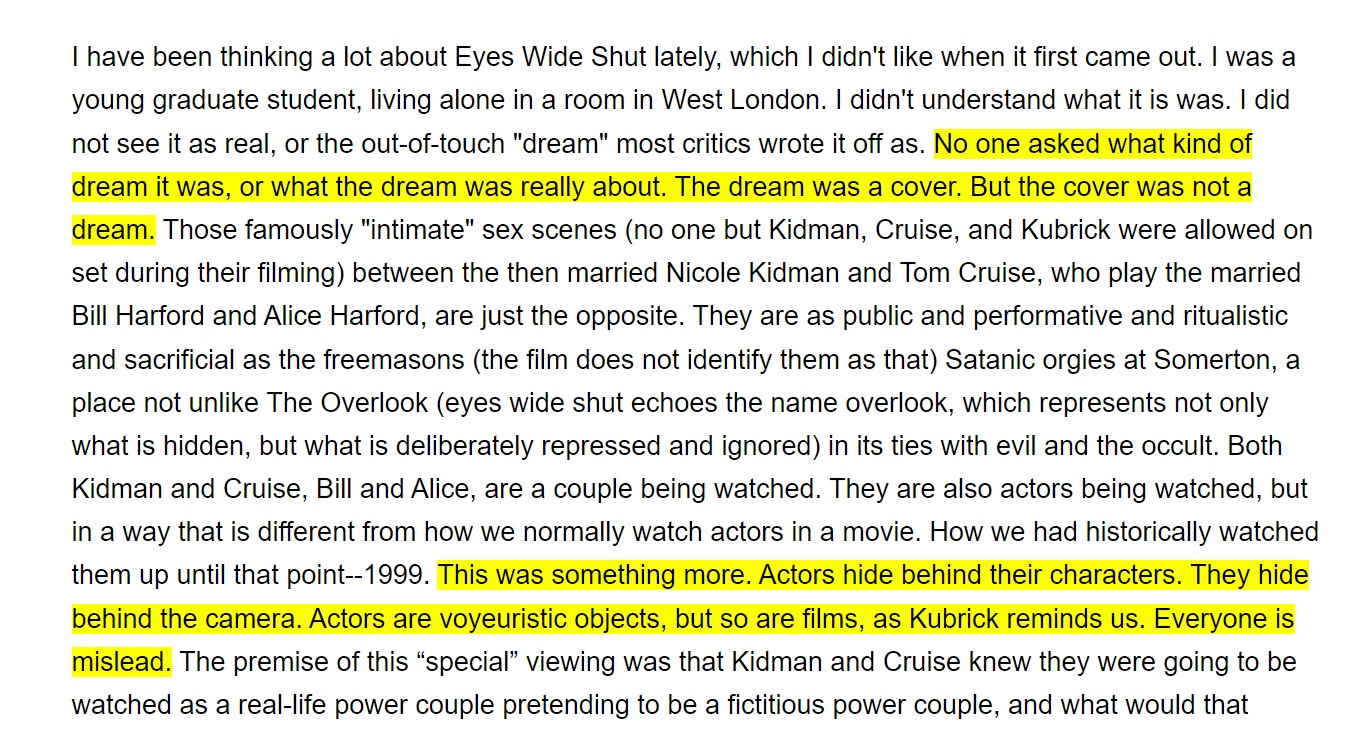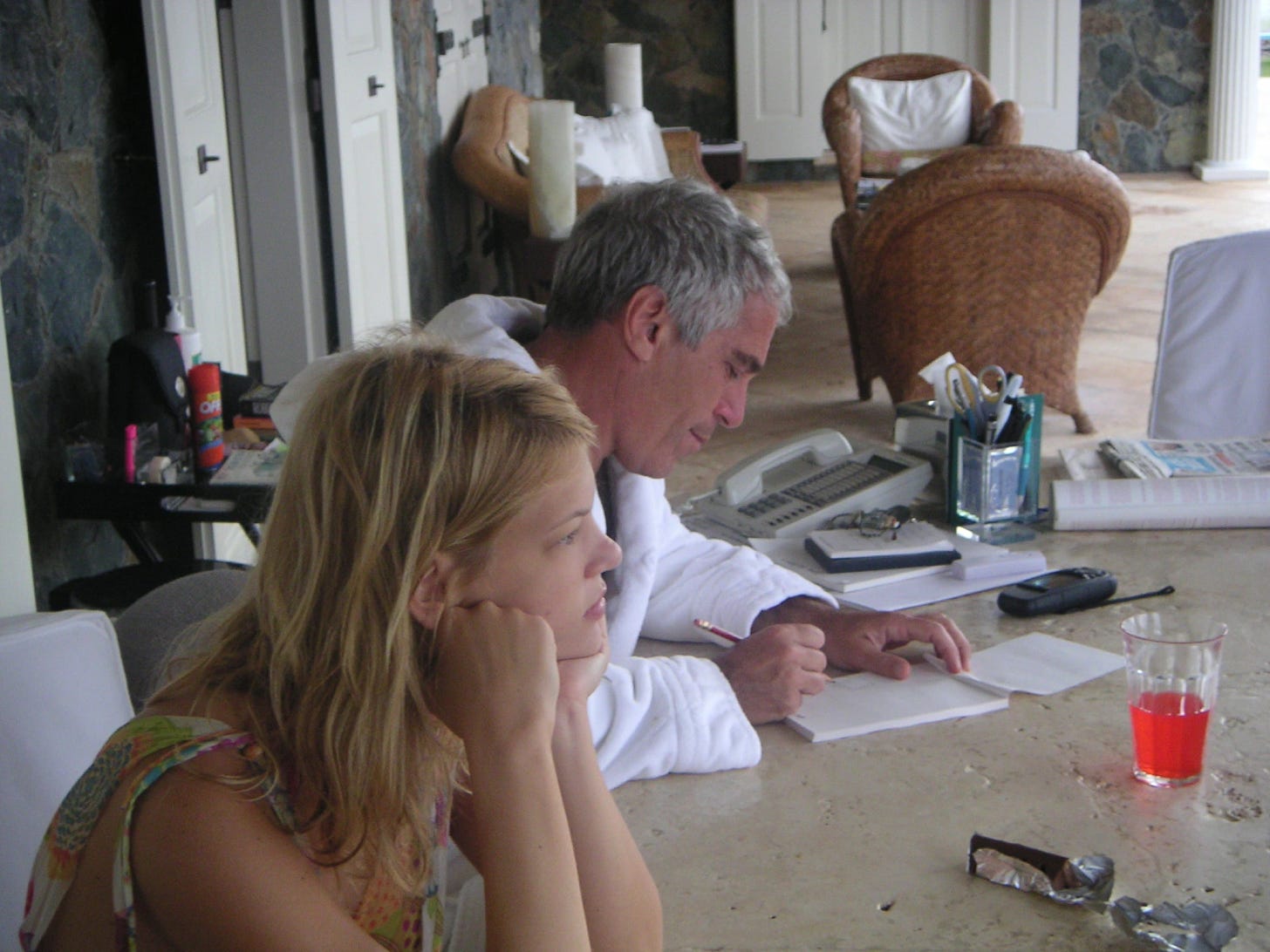Masha Tupitsyn has written an important post on Eyes Wide Shut (see 11 April entry). I want to share some screenshots with the key moments highlighted. And also to make some iterations, comments, additions.
This is going to be something like a theory of covers. Of the cover. That is not quite Tupitsyn’s phrase. It’s how I read what she says of the ‘cover’. I think such a theory could go far right now, and that is what she is implying. It would account for mostly everything in the politics of politics that is now everything. That is, this ‘covering’ is now all that happens.
In the film Eyes Wide Shut, Tupitsyn says, there is a sense of dream and of the dream being a ‘cover’ (and yet the cover itself is real).
The dream was a cover. But the cover was not a dream.
Straightaway one thinks of the Nixonian term ‘limited hangout’, which Tupitsyn all but uses by name later on. A limited hangout or modified limited hangout is when one reveal is used to hide or cover over an even bigger reveal. The murder of Jeffrey Epstein is a good example: this was a big story, but what it really did was to cover over a much larger story of international child abuse and trafficking that is still dormant, still ‘covered’.
When Tupitsyn says in the context of the film, ‘everyone is mislead’, she means it literally. The theory of covers would anticipate something like a complete covering, a general fractal state gone wrong, where each new issue layers up on previous ones, on top of another one which was never really seen to begin with. Before you know it, there is something else, a new cover on and over the last cover. Even as one thinks one has uncovered the relevant cover and got to the thing itself (‘this hidden crisis’, she says), everyone is still mislead. There is still the overall cover up.
The application to today’s politics of politics is self-evident. Not only are there covers, but these covers are contagious. Not only are the covers a form of contagion, they are contaminant. The problem (problema means ‘shield) is that each cover seems to have no integrity of itself. We are dealing with disintegration—of the covers. Each cover not only covers but corrodes the other covers. How is anything left? Tupitsyn goes on:
Revealing a secret ‘in order to keep an even bigger secret’ is the definition of the Nixonian limited hangout that one could say is now contaminatively general. Another example would be the two recent opioid epidemic productions—Alex Gibney’s The Crime of the Century (HBO, 2021) and Danny Strong’s Dopesick (Hulu, 2021). Both reveal one secret in the past (the opioid crisis) in order to keep a far bigger one in the present (the criminal event called ‘Covid’). As Tupitsyn says,
And this has been the pattern for the last few years with the exposés of the streaming-era.
The experience of watching Dopesick is the experience of watching something enthralling, but the series is also an astonishing cover for what is happening in the present, for what has just happened (it’s addictive series as relapse). It would perhaps be hard to blame the makers for this remarkable occlusiveness, and yet it would be equally stupid not to wonder at the timing and neglect of facts around the continuity of the role of the international FDA cartel in both crises.
This broad situation incites for Tupitsyn a crisis in her writing. The sudden awareness that everything is cover, that everyone is mislead, that there are no exceptions, that even statements of the most important thing in the world are structurally unlistenable, is enough to cancel out any motive for writing. Or rather, any trust in a motive for writing. Writing itself is without covers—but that means full of alibi, with no excuse, sheer lack of posterity and headway in the present and only now there.
Since everyone has got everything so wrong, why should I escape that law right now? Why should anyone? Why should art itself even when developed in realms of technic perfection be able to make it into the zone of the singularism and veracity of life? If there is a law of covering here, it applies to ‘even the best of us’. In other words, the law always carries with it a kind of tacit ‘this includes me’, at depth.
(At the same time, a position has to be imagined aside from or outside all this, even if just for it to be said. This is why the theory of the retard developed and implied by this blog cannot simply include angelicism01 as its object. Is the one who announces the retard list a ‘retard’? We had better hope not.)
Next:
Interrogating the wrong secret for the right reason is what everyone does now, ‘even the best of us’. Take Nan Goldin for example. No doubt Goldin has the best of intentions in protesting against the crimes of the Sackler family in the foyer of the Guggenheim, and yet it is quasi criminal that she fails to announce that the same FDA headed by Janet Woodcock that turned a blind eye to use of oxycontin for moderate pain is still headed by Janet Woodcock and gave the nod to Moderna and Pfizer vaccines. The refusal to see continuity here, regardless of best intentions, is what determines the self-folded self-relapsing nature of the present. When we uncover we inevitably fail to notice something else. When we select an important secret, we inevitably cancel out other secrets, some of which may be infinitely more important. And yet even the most important secret can simply act like another distraction—a distraction from itself. Such is the degenerescent fractality and fatality of ‘covers’ in 2022.
But this passage by Tupitsyn, masquerading as a fragment of film review, actually becomes incalculably important. When she writes of the secret ‘almost no one knows or talks about, and that no one can stop even when they do talk about it’, are we entitled to ask which one? Are we even entitled to wonder why the apparent omission here? If this secret is so important, ‘the bigger secret’, why not name it? If she is wrong to have not named it, and made her writing pointless in doing so (as she in fact implies), why fail to do so again, right here? Is that the only option? Since naming ‘the bigger secret’ risks a kind of reductio ad infinitum of ‘covers’, what need of new uncoverings, even at the end? Is it even the case that the bigger the secret, the less it can be and is (un)covered even when it is? A sort of law of fractal asymmetry.
Whatever the exact designation, Tupitsyn asks a further question. Which is, is there anyone not involved in these ‘terrible things’? Let us understand ‘terrible things’ here as the business of being unable to name the greater secret at the same time as we are unable to not mention it. Mention, use: neither assures us any headway. Something has happened to the greater secret, something terrible. Something terrible has happened to the great secret, to the greater secret—to the terrible secret. This is the hidden crisis, perhaps: the secret of the secret’s terrible degenerescence, its more-than-mortal bleed. The extinction that cuts into the conceptual order of death.
There is almost too much else to iterate. This whole thing—what Tupitsyn also calls ‘all’—is also a story, the story. She explicitly asks whether this is ‘the whole story’. What drives everything just is the not being able to say/not being able to not say the greater secret, and what is probably a tightening and blurring between these possibilities. The greater secret is the most important thing in the world, but it’s also the terrible fact we can not keep it or have kept to it. Exponentially.
And here art, she says, is a cover. Let’s iterate. ‘Art’—every kind of art, with no exception—is now nothing less than a cover for the greater secret, ‘the one that no one can stop even when they talk about it’. A little further down she will say, she will imply, all art is ‘psyop’. Such follows naturally. And this needs to be read as more than radical. Not as a repetition of previous and known extents of what used to be called complicity.
.
Why does Tupitsyn not name the greater secret here, the one we can’t stop? Because she is operating the theory of secrets to some kind of ‘advantage’ for her writing’s confession of stopping, or because the theory of covers operates on her, covering over through sheer increasing historical force any attempt to say just what it is, even when it is said or unsaid with the best of intentions? Films are hardly a refuge here, even though they contain highly modulated voyeuristic objects. No art, however technically perfect it may become, ever now can be.







Agree
🎨 🙍🏻♀️